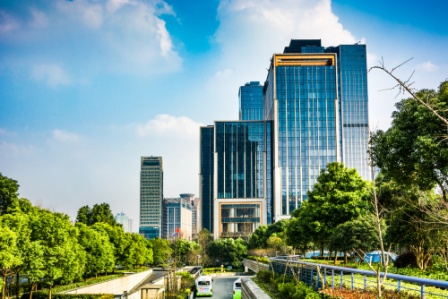In the past decades, India has emerged as a leading destination for Global Capability Centers (GCCs), influencing the growth of the country's commercial real estate sector. Originally established for back-office support, GCCs have transformed into innovation centers, handling core operations like R&D, IT development, customer support, and data analytics.
The surge in GCC activity has propelled rapid growth of real estate investment in India, particularly in the premium office space segment. The demand for sophisticated, tech-driven work environments to support complex functions has triggered a virtuous cycle - one where the growing presence of GCCs is fueling cutting-edge infrastructure in any commercial property for lease, which in turn is attracting more global corporations to expand in India.
Shaping Commercial Real Estate Demand in Major Cities
The rapid expansion of GCCs has fundamentally altered the dynamics of commercial real estate in India's urban centers. Developers are no longer selling square footage but entire ecosystems tailored to the needs of global enterprises. Many new projects in Noida and other cities in India are focusing more on developing collaborative spaces with ergonomic designs and smart building solutions to attract and retain top-tier GCC tenants. The expansion of GCCs has also led to the emergence of secondary markets and micro-markets in once-peripheral zones of major cities, propelling real estate companies to invest further in the commercial segment.
The influx of GCCs has also influenced the leasing patterns as well – long-term leases are becoming a norm. Given that institutional investors, both domestic and international, view properties leased by GCCs as stable and attractive assets, the long-term nature of leases signed enhances the appeal of commercial real estate as an investment avenue. Developers, for their part, are continually looking for ways to differentiate their projects and make them appealing to investors and GCCs alike.
Driving Technological and Sustainable Transformation
With the modern GCC workplace demanding functionality and seamless integration of technologies, smart buildings equipped with IoT sensors are becoming the norm. From automated lighting and temperature controls to advanced security systems, and real-time monitoring of energy use to identifying occupancy patterns, the tech-enabled office space is no longer a luxury but a necessity for attracting and retaining GCC tenants. At the same time, global corporations are increasingly committed to reducing their carbon footprints, and GCCs are no exception. The demand for energy-efficient, LEED-certified buildings has pushed developers to adopt environmentally conscious construction practices.
Commercial real estate companies are ensuring that their projects incorporate solar panels, rainwater harvesting systems, and efficient HVAC solutions. Green office spaces with daylight-optimized layouts, indoor air purification systems, and eco-friendly materials are in high demand. Developers are building "future-proof" spaces that adapt to rapidly changing technologies and workplace dynamics. Moreover, smart campuses and mixed-use developments create integrated ecosystems combining work, leisure, and sustainability.
Connecting Productivity & Employee Well-Being
The workplace priorities of GCCs equally emphasizes collaboration and an environment that supports it. As a result, they prefer holistic, employee-centric spaces over traditional office layouts. Developers of new projects in Noida and other cities are incorporating multi-use zones within office complexes, incorporating shared amenities such as breakout zones, collaborative lounges, and recreational areas to foster a sense of community and enhance employee satisfaction.
Employee wellbeing is also among the non-negotiable priorities – touchless technologies, advanced air filtration systems, and wellness-focused amenities are on high demand. However, the emphasis on employee well-being extends beyond physical health, including mental wellness and overall satisfaction. Many office spaces now feature biophilic design elements such as natural lighting, indoor plants, and views of green spaces to create a calming, rejuvenating atmosphere. Breakout areas, game rooms, and recreational spaces are intended to enhance the workplace experience, helping employees unwind and recharge during the workday.
The relationship between GCCs and commercial real estate in India is a story of mutual growth and adaptation. GCCs have compelled the real estate sector to elevate its game, driving innovation, quality, and sustainability. In return, the industry has enabled GCCs to flourish by offering world-class office spaces that integrate with global operational models. As India's urban and economic landscape continues to evolve, GCCs will remain at the heart of this transformation.





Comments